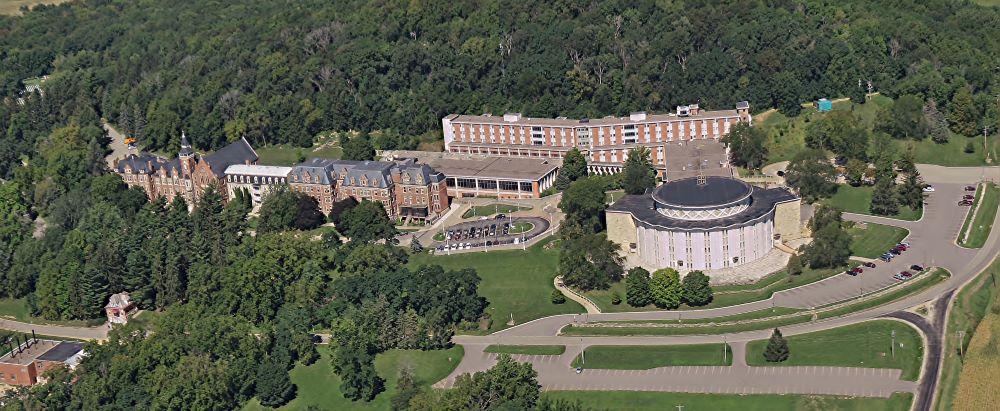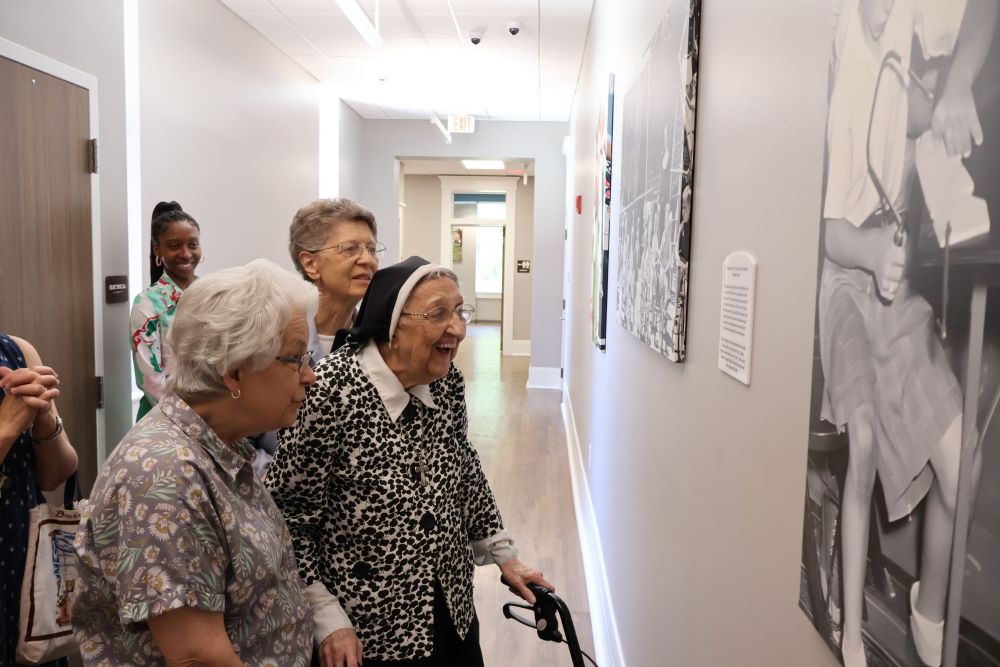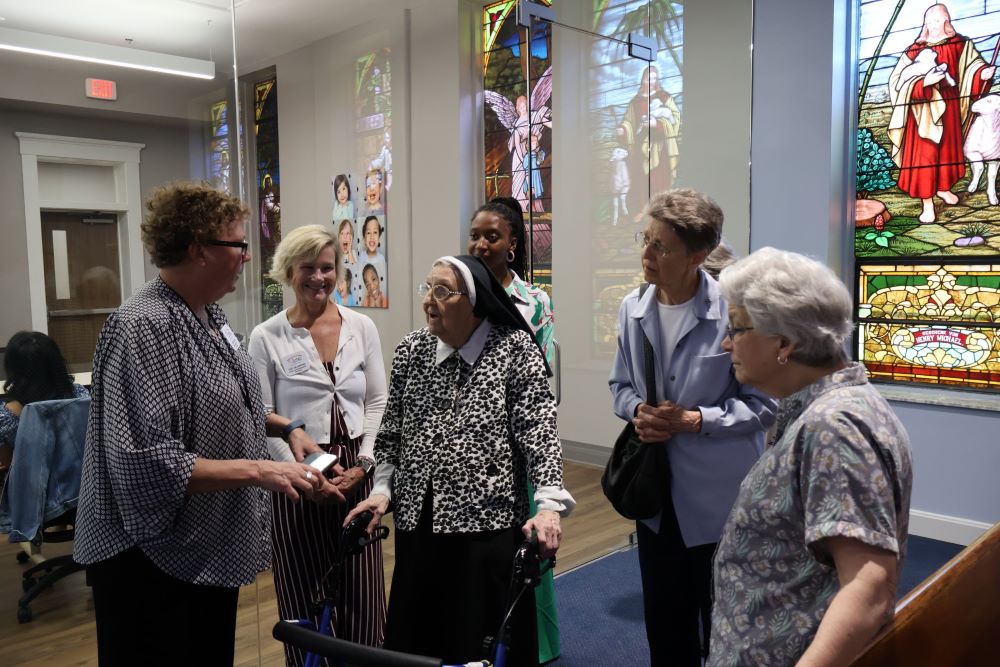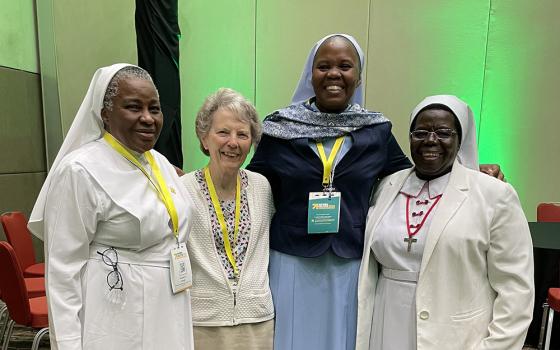
Sinsinawa Mound has been home to the Dominican Sisters of Sinsinawa, Wisconsin, since their founding in 1847, with the Stone Building dating to 1844. (Courtesy of the Dominican Sisters of Sinsinawa)
Editor's note: Global Sisters Report's Monday Starter is a feature from GSR staff writers that rounds up news from or about women religious that you may otherwise have missed.

The Dominican Sisters of Sinsinawa have accepted a proposal to sell several buildings at their motherhouse campus in southwest Wisconsin, Sinsinawa Mound.
Tricon Construction Group plans to renovate existing buildings for an active senior living community and event center and to explore partnerships with local community organizations responding to human needs in the area.
"We are grateful that Tricon and other neighbors in this tristate area value these iconic buildings and are committed to repurposing them so that others will be able to enjoy the special place that is Sinsinawa Mound," said Sr. Toni Harris, the congregation's prioress, in a June 6 press release. "While there are details that need to be worked out before finalizing a transfer of ownership, we appreciate Tricon's plan for stewardship of some of our buildings into the future."
The buildings being sold to Tricon are the rotunda building, which houses Queen of the Rosary Chapel; the 1964 building, which includes the main foyer, dining room, kitchen, meeting spaces, wellness center, sleeping quarters and guest rooms; and the convent building. The sisters will retain ownership of the Stone Building and St. Clara Chapel; those spaces will be renovated to serve as congregation office space, public meeting and prayer space, community living space for sisters, and exhibit areas.
The sisters will continue to own the Academy Apartments, two houses on the property, and the surrounding land. Sinsinawa Mound will continue to serve as the Motherhouse of the Congregation.
The press release did not include the property's selling price.
"We are very excited to be part of the Sinsinawa Mound's future. I was born and raised in Kieler, Wisconsin, and Sinsinawa Mound was always a place that I admired," said Tricon owner Ron Richard in the announcement. "The buildings are in great structural shape, and it would be a shame to see them deconstructed or just not used. Because of the current housing need in the tri-state area, along with the growing popularity of amenity filled retirement communities, we feel that our proposed plan will be a great benefit to the surrounding area."
The sisters also remain committed to supporting regenerative agriculture into the future and will continue to explore ways to collaborate with farmers and groups committed to sustainability.
Tricon Construction Group is headquartered in Dubuque, Iowa, less than 10 miles from Sinsinawa Mound, and performs work throughout Iowa, Illinois and Wisconsin.
Advertisement
Sisters Servants of Mary convent in the Bronx closing
The Sisters Servants of Mary convent in the New York City borough of the Bronx is closing and the congregation is seeking a buyer for the sisters' property.
The Bronx Times newspaper reported June 20 that in an April letter to state Assemblymember Michael Benedetto, the congregation said its foundress, St. Maria Soledad Torres Acosta, "emphasized the importance of our sisters living in full community. For that reason, because of the few sisters living here, they have decided that we should join other convents of the Sisters Servants of Mary."
The congregation, founded in Madrid, Spain, in 1851, established a U.S. province in 1913 and has six convents in the U.S., including the one in the Bronx.
In early June, only six sisters remained at the Bronx convent, but now there are only three because sisters have begun going to other convents in the U.S. The U.S. province is based in Kansas City, Missouri.
The charism of the province is the care of the sick and dying in their homes. The Bronx Times reported that at its peak, up to 30 sisters lived at the convent, and ministered to nearby families.
The congregation believes that to do its best work, a community of at least 15 sisters is needed at each convent.
In the background is the reality of fewer sisters because of the decline in vocations, Sr. Silvia Juarez told the Bronx newspaper.
"We are very sad, we don't want to go, but we need to go," Juarez said. "We continue to pray for vocation, for more sisters. We need to have the biggest presence wherever we go so hopefully we get more young people to join us."
The decision to leave the Bronx was not made easily, given the congregation's strong ties to the borough.
"We love the Bronx," Juarez said. "We love the community."

Ursuline Sisters of Louisville, from left, Barbara Bir, Loretta Guenther and Rita Dressman look at a hallway plaque honoring the sisters June 2 at St. Joseph Children's Home. Caitlyn Green, a member of St. Joseph’s advancement team, looks on. The Ursuline Sisters served children at the home from 1897 to 2010. (Courtesy of Ursuline Sisters of Louisville/Kathy Williams)
Double surprise for Ursuline sister who ministered to children
Sr. Loretta Guenther received not one, but two surprises June 2 when she toured the newly renovated west wing of the Landmark Building of St. Joseph Children's Home in Louisville, Kentucky.
Guenther, an Ursuline Sister of Louisville, ministered for 36 years as a live-in house parent at the orphanage. The sisters ran the home from 1897 to 1972, when it became an independent entity, and continued ministering there until 2010; Guenther was the last sister to work there. More than 150 Ursulines served at the home during those 113 years.
During the tour of the renovations, Guenther discovered a new plaque dedicated to the sisters and containing a quote from Guenther herself: "It's the simplicity, the love that children have that makes them so special. I was so blessed to be at St. Joseph because I know children are close to God."
But there was another surprise, as well — the chapel had been named for her in honor of her nearly four decades of service at St. Joseph.
Kathy Williams, director of communications for the Louisville Ursulines, said Guenther was moved to tears, and speechless when she saw the chapel was named for her.
Williams says the children often couldn't pronounce "Loretta," so they called her "Sister Ray-Ray," or "Sisterella" for Cinderella.
"I was so blessed to work at St. Joseph's for so many years," Guenther said in a written statement. "I loved caring for the children there because they are so innocent and so close to God. St. Joseph's is family to me."
Williams says many of the children she cared for remain in touch with her, and some call her "Mom."

St. Joseph Children's Home CEO Grace Akers and Chief Advancement Officer Suzy Hillebrand speak with Srs. Loretta Guenther, Rita Dressman and Barbara Bir in the chapel while Caitlyn Green looks on. (Courtesy of Ursuline Sisters of Louisville/Kathy Williams)
Webinar explores connection between trafficking, forced migration
A recent webinar by two sister groups explored the nexus between human trafficking and forced migration.
The June 14 event by the U.S. Catholic Sisters Against Human Trafficking and the National Advocacy Center of the Sisters of the Good Shepherd, and which is now available on YouTube, was attended by several hundred participants.
"Human traffickers amplify the vulnerabilities faced by those who are forced, through conflict, disaster, and disparity, to flee their homes," Katie Boller Gosewisch, executive director of U.S. Catholic Sisters Against Human Trafficking, said in a statement. "We, as Americans, as faithful citizens, have a duty of care to ensure that those who seek refuge and safety at our border are not met with malice and avarice."
Fran Eskin-Royer, National Advocacy Center's executive director, said groups like hers are trying to build bridges "across political divides and seek bi-partisan support whenever possible. We are grateful that ending human trafficking is a goal shared by policymakers on both sides of the aisle."
Sr. Ann Scholz, a member of the School Sisters of Notre Dame, moderated the webinar and noted that "women religious are long-time leaders in the efforts to put an end to the recruitment and exploitation of others by force, fraud or coercion."
"Catholic sisters and their colleagues have seen firsthand how human traffickers prey on those forced to flee their homes by circumstances beyond their control."
Sister of Providence Tracey Horan, an associate director of the Kino Border Initiative, knows these realities firsthand, working in documenting abuses on both sides of the U.S.-Mexican border.
"People face abuse because of a lack of clarity and are vulnerable," she said, noting the high-risk of vulnerability and risk of trafficking, and attendant abuse and extortion.
Cristían Eduardo, a Mexican immigrant and survivor of sex and labor trafficking and now an advocate, speaker and educator on the issue of trafficking, said the decision to flee and try to enter the United States is never easy.
He noted that many migrants fall victim to trafficking due to a combination of factors, including English language challenges; uncertainty of their legal rights; and fear of both law enforcement authorities and deportation.
"Traffickers," said Eduardo, "use this fear as a tool of coercion to control them." ronx Times.









